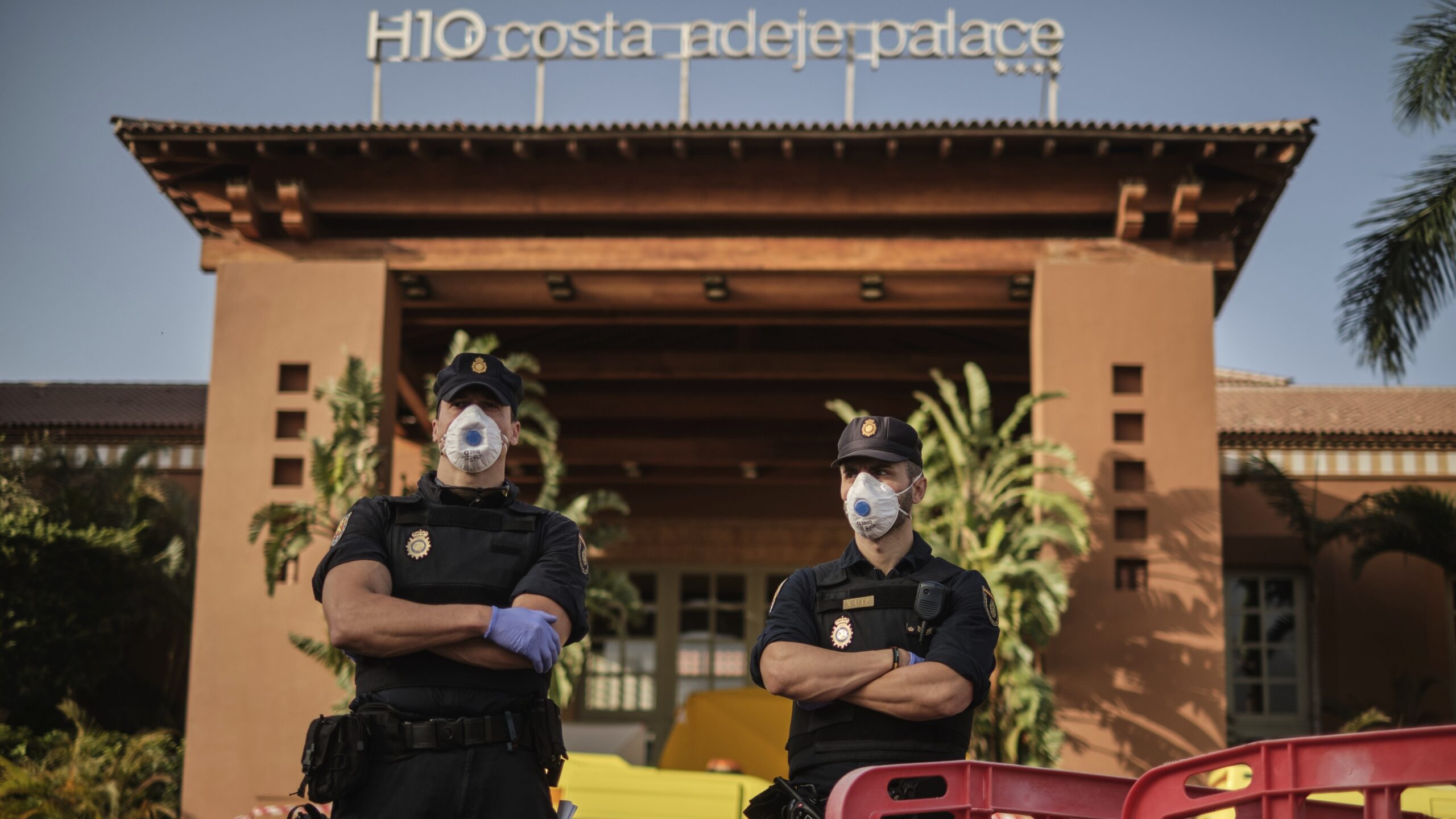Coronavirus: More New Cases Are Now Reported Outside China Than Inside

The virus that causes COVID-19 is now found in 37 countries outside of China, WHO Director-General Tedros Adhanom Ghebreyesus says. Here, police officers wear face masks in front of a hotel in the Canary Island of Tenerife, Spain, Wednesday. Spanish officials say a tourist hotel on island has been placed under quarantine after an Italian doctor staying there tested positive for the coronavirus.
AP
“Yesterday, the number of new cases reported outside China exceeded the number of new cases in China for the first time,” the head of the World Health Organization said Wednesday in an update on the coronavirus disease COVID-19.
“Outside China, there are now 2,790 cases in 37 countries, and 44 deaths,” WHO Director-General Tedros Adhanom Ghebreyesus said at a briefing in Geneva. By contrast, the WHO says, only 10 new cases were reported in mainland China outside of Hubei province, where the virus emerged months ago.
The latest global tally includes dozens of new cases in South Korea, Italy and Iran. Each of those countries has confirmed at least 10 deaths so far from COVID-19, a mark that surpasses the death toll reported in many Chinese provinces.
Tedros is urging the international community to have “hope, courage and confidence” that the new respiratory virus can be contained, citing 14 countries that haven’t reported a new case in more than a week.
Worldwide, there are currently 81,191 cases of the novel coronavirus, according to a dashboard created by the Johns Hopkins Whiting School of Engineering. That number includes 30,281 cases in which people recovered from COVID-19.
But Tedros also warned that the situation could get worse, saying, “At the same time, all countries, whether they have cases or not, must prepare for a potential pandemic.”
That echoed Tuesday’s stark warning from the Centers for Disease Control and Prevention to people in the United States. Dr. Nancy Messonnier of the CDC said Americans should prepare for the spread of the new coronavirus stateside. “It’s not so much a question of if this will happen anymore, but more really a question of when it will happen — and how many people in this country will have severe illness,” she said.
The U.S. public should be ready to adapt to what could be disruptive changes, Messonnier said, speaking weeks after COVID-19 worries forced the CDC to issue its first quarantine in more than 50 years.
“I had a conversation with my family over breakfast this morning,” Messonnier said Tuesday. “And I told my children that while I didn’t think that they were at risk right now, we, as a family, need to be preparing for significant disruption of our lives.”
The changes could range from the cancellation of public gatherings to school shutdowns, she said, mentioning steps that health officials are already taking in China, Italy, South Korea and elsewhere.
In his update on the global impact of COVID-19, Tedros said the recent clusters of cases in Italy and Iran have already affected other countries.
“There are now cases linked to Iran in Bahrain, Iraq, Kuwait and Oman,” he said, adding, “There are now cases linked to Italy in Algeria, Austria, Croatia, Germany, Spain and Switzerland.”
In Spain’s Canary Islands, about 1,000 tourists are now under quarantine in a hotel on Tenerife after an Italian doctor staying at the hotel tested positive for the coronavirus.
To prevent the spread of viral infection, the CDC recommends taking several basic steps, from avoiding close contact with people who are sick to washing hands with soap and water for at least 20 seconds.
The coronavirus epidemic has caused people in many countries to wear face masks. But the CDC says it “does not recommend that people who are well wear a facemask to protect themselves from respiratory diseases, including COVID-19.”
Instead, the health agency says, face masks should be worn by only two groups of people: health care providers and those who are sick and thus could spread the illness. It recommends that medical staff wear N95 respirators to prevent infection when treating patients.
On a broader scale, the WHO’s Tedros says every country should make it a top priority to protect workers who are dealing with the health crisis. And he says agencies should work with communities whose members are most at risk, “particularly the elderly and people with underlying health conditions.”
Despite the worrying rise of cases at the international level, Tedros again rejected calls Wednesday for the WHO to declare a pandemic, saying it’s not an accurate label for a virus he still views as containable. He has also recently noted that the virus’s fatality rate outside of Hubei province is less than 1%.
The WHO declared the coronavirus outbreak a global health emergency in January, as cases surged in China. The organization now says it believes the epidemic peaked and plateaued in China between the end of January and the early February.
Despite that apparent progress in China, there are fears that COVID-19 could continue to disrupt one of the world’s most important economies, which has already been grappling with the effects of a trade war with the U.S.
The rapid spread of the disease has also prompted worries that the virus could exact a severe economic toll elsewhere, through extended work closures, travel restrictions and other measures.
In his closing remarks Wednesday, Tedros said international unity is crucial in battling the outbreak and its consequences.
“We are not just fighting to contain a virus and save lives. We are also in a fight to contain the social and economic damage a global pandemic could do,” he said.
Tedros added that the WHO is working with the World Bank and the International Monetary Fund to come up with ways to lessen the epidemic’s potential economic impact.
“Once again, this is a time for global solidarity — political solidarity, technical solidarity and financial solidarity,” Tedros said.
9(MDAxODM0MDY4MDEyMTY4NDA3MzI3YjkzMw004))







